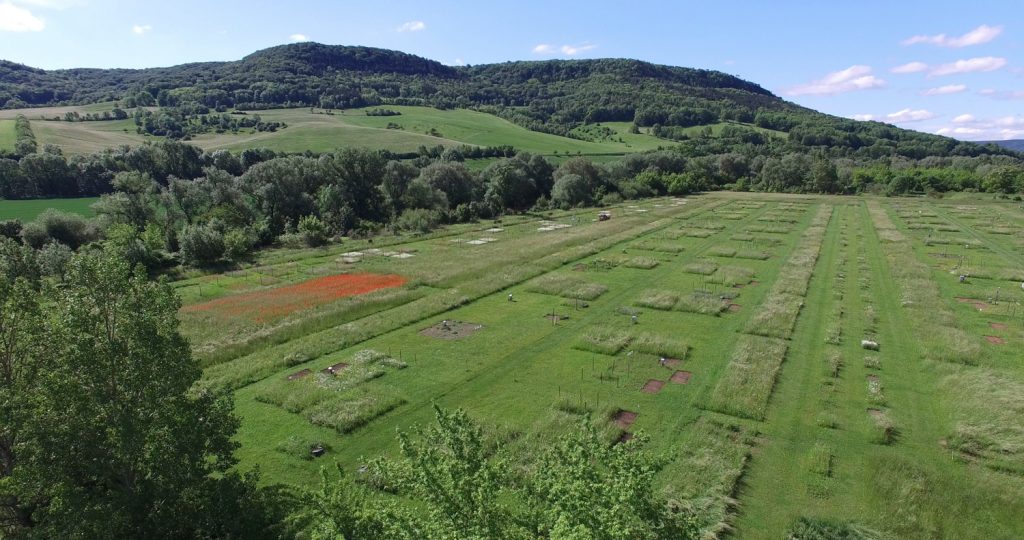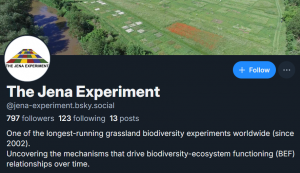The Jena Experiment is seeking PhD students, postdoctoral researchers and technical staff
Within the DFG Research Unit FOR 5000 (Biotic interactions, community assembly, and eco-evolutionary dynamics as drivers of long-term biodiversity–ecosystem functioning relationships), nine four-year PhD positions, a three-year postdoctoral position, and a position for a technical assistant are available.

The Jena Experiment (www.the-jena-experiment.de) has been running since 2002 and aims to uncover the mechanisms that determine BEF relationships in the short- and in the long-term. During the last years the Jena Experiment provided novel empirical evidence that ecological and evolutionary processes are intertwined in determining biodiversity-ecosystem functioning (BEF) relationships, and long-term experiments are key not only to gain a basic understanding of the relative importance as well as interactions of these processes but also to apply these concepts to better provisioning of ecosystem functions and stability. In the next few years, we will focus on the biodiversity drivers of ecosystem stability, including temporal stability using unique time series and stability in response to extreme climate events, such as drought, flooding, hot spells, and exceptional frost periods.
We offer an international and interdisciplinary research environment. The involved institutions seek to increase the number of women in those areas where they are underrepresented and therefore explicitly encourage women to apply. We are committed to employing more handicapped individuals and especially encourage them to apply. To learn more about the open positions and how to apply, see the following link: https://the-jena-experiment.de/index.php/job-opportunities/
Subproject 01: Plant Physiology
Principle Investigators: Claudia Guimarães-Steinicke and Hannes Feilhauer, Leipzig University
Summary:
Climate change will increase the occurrence of extreme events that trigger both species evolution and selective removal of not well-acclimated species. Plant biomass production is a key response indicator of plant community performance under unfavorable conditions. However, in biodiversity research, biomass is usually measured once or twice throughout the growing season, which may hide seasonal plant responses during and after extreme events. As physiological processes are closely related to plant biomass production, a comprehensive and continuous assessment of plant physiological performance can improve our understanding of immediate responses to and recovery after extreme events and, consequently, carbon assimilation of the plant community. Near-surface remote sensing technology offers a unique opportunity to assess these dynamic changes and the community condition in dense time series.
In this subproject, we aim to understand (1) the physiological response of plants to extreme climate events at multiple levels – from plant organs to communities -, and (2) whether increasing plant diversity may lower the consequences of such extremes. For that, an assessment of fundamental physiological plant traits (via proximal sensing) such as leaf water content, leaf chlorophyll content, surface temperature, community structure, and leaf angles are required, as these data can provide a holistic understanding of plant responses to drought at different time scales (including resistance to and recovery from the event). We hence intend to 1) assess plant community responses to drought based on hydrological and structural-functional traits, (2) test plant community resistance and recovery in different dimensions of community stability, and (3) demonstrate how plant functional traits retrieved from remote sensing techniques can elucidate the role of biodiversity role in plant community resistance to and recovery after extreme events.
Available positions: 1 PhD student
Job advertisement: https://www.uni-leipzig.de/stellenausschreibung/artikel/wissenschaftlicher-mitarbeiter-m-w-d-2023-10-27
Contact: Dr. Claudia Guimaraes (claudia.steinicke@uni-leipzig.de)
Subproject 02: Chemical Interactions
Principle Investigators: Unsicker, Sybille, Kiel University; Weisser, Wolfgang, Technical University of Munich
Summary:
Plants constitutively release a large diversity of volatile organic compounds (VOC) from their organs. However, when attacked by e.g. herbivorous insects, VOCs are released at much higher concentrations and in greater diversity. Abiotic factors such as light, water availability, and temperature can also strongly influence plant VOC emission. In their natural environment, plants are often simultaneously exposed to abiotic and biotic stress, and this combined stress can lead to synergistic effects that cannot be predicted by individual stress events. To date, we know little about the stability of VOC emissions from individual plants and plant communities, and we don´t know whether the species-specific responses of plants to biotic and abiotic stresses lead to stabilization of VOC emissions at the community level when communities are more diverse, as predicted by the portfolio effect. Our previous results show that plant species richness effects the VOC emission of plant communities and plant individuals within those communities.
In this subproject, our main aim is to investigate whether plant diversity stabilises plant VOC emission as an important ecosystem function, both over time and during periods of resistance and recovery during and after an extreme climate event. We will use repeated measurements throughout the growing season to assess the temporal stability of plant VOC emission. In addition, we will measure VOC emission in response to an extreme climate event, i.e. a hot drought, in an Ecotron experiment.
Finally, we will test whether plant species richness can buffer the effects of combined biotic and abiotic stress on VOC emissions of individual plant species and plant communities in a microcosm experiment. Our measurements of VOC emission will also contribute to test the Research Unit´s main hypothesis that multifunctional stability is highest in high-diversity plots.
Available positions: 1 PhD student;
Job advertisement: Wissenschaftliche*r Mitarbeiter*in mit Möglichkeit zur Promotion am Botanischen Institut, Abteilung für Pflanzen-Umwelt-Interaktion (PDF download)
Subproject 03: Root trait diversity
Principle Investigators: Weigelt, Alexandra, Leipzig University; Mommer, Liesje, Wageningen University
Summary:
Biodiversity can be considered as the earth’s safety net for mitigating climate change, as biodiversity is known to increase ecosystem functioning and stability. It is often hypothesised that increased species richness in grasslands increases resistance and recovery of plant communities to drought. Despite the urgency of the topic due to the increasing frequency and intensity of droughts worldwide, the underlying mechanisms of these beneficial biodiversity effects are not fully understood. Specifically, we have an incomplete perspective of how plant functional trait composition and diversity drive resistance to and recovery after drought.
In this subproject, we aim to provide an integrated perspective on plant functional traits – with a focus on root traits – to advance our mechanistic understanding of plant community responses to drought. We will build on a recently developed plant trait framework, that for the first time, integrated above- and belowground plant functional traits, and will expand it with 1) plant hydraulic traits,as these have not been implemented in the framework yet, and 2) root biomass allocation,as the potential to increase root biomass allocation to deeper soil layers might be fundamental for understanding plant responses to drought.
First, we will select the most relevant shoot, root, and hydraulic traits in a workshop with a diverse team of international experts and test these traits at the species level in a microcosm experiment. Then, we will scale up to the community level to disentangle effects of average trait composition and diversity for resistance to and recovery after droughts. Finally, we will elucidate the importance of functional diversity at the community level for resistance to and recovery after droughts. This knowledge on plant functional traits will be essential to design and restore plant communities that are resilient to climate change.
Available positions: 1 PhD student
Contact: Prof. Dr. Alexandra Weigelt (alexandra.weigelt@uni-leipzig.de)
Subproject 05: Soil nutrient dynamics
Principle Investigators: Yvonne Oelmann, University of Tübingen
Summary: Extreme events such as floods or droughts affect the availability of water and, thus, inevitably impact nutrient cycling in soils. The majority of grassland studies reported a nutrient flush in soil upon rewetting after drought which is eventually followed by nutrient leaching losses compromising water quality after droughts. The nutrient flush is linked to nutrient dynamics of plants and soil microorganisms and is determined by opposing processes during the drought (= resistance) and after the subsequent rewetting (= recovery).
The objectives of our subproject SP05 are (i) to assess the resistance and recovery of soil microbial nutrient dynamics during and after a drought, respectively, (ii) to test the effect of plant diversity on the resistance and recovery of microbial nutrient dynamics in soil and link this to other organisms (plants, soil fauna), and (iii) to test the long-term effect of plant diversity on soil nutrient dynamics under extreme events. We hypothesize that the soil microbial community reduces nutrient uptake and is prone to nutrient release during drought but rapidly takes up nutrients after a drought. In other words, microbial nutrient pools in soil quickly recover after drought and furthermore, faster at high as compared to low plant diversity. At high plant diversity, the nutrient dynamics of soil microorganisms and other organisms are complementary, i.e. temporally asynchronous. Consequently, plant diversity stabilizes nutrient dynamics in spite of frequent extreme events in the long run.
To test these hypotheses, our research will be based on the common research platforms (ResCUE Experiment; Main Experiment). We will rely on data of different temporal resolutions to assess nutrient dynamics related to resistance, recovery and stability. We will use state-of-the-art methods (soil microbial nutrient concentrations), stable isotope labeling and natural abundance levels of stable isotopes.
Available positions: 1 PhD student
Job advertisement: https://uni-tuebingen.de/universitaet/stellenangebote/newsfullview-stellenangebote/article/research-position-in-the-dfg-ru-for-5000-the-jena-experiment-f-m-d-e-13-tv-l-65/
Contact: Prof. Dr. Yvonne Oelmann (yvonne.oelmann@uni-tuebingen.de)
Subproject 06: Plant nutrient responses
Principle Investigators: PD Dr. Christiane Roscher, UFZ/iDiv
Summary: Plant tissue nutrient concentrations and ratios are important predictors of ecosystem processes and ecological interactions. The major objective of the subproject “Plant nutrient responses” is to study the effects of plant diversity on the temporal dynamics of plant nutrient responses, including their stability as temporal long-term invariability, resistance during and recovery after environmental perturbations. Specifically, we will (1) analyze time-series data of community-level elemental concentrations, ratios and stocks of carbon (C), nitrogen (N), phosphorus (P) and potassium (K) in plant aboveground biomass to identify the drivers underlying diversity effects on plant community nutrient responses and their temporal variability. (2) We will study species-specific leaf concentrations of C, N, P and K to decompose the importance of plant community composition versus the importance of intraspecific variation in leaf nutrient concentrations for the community means and diversity of plant tissue elemental concentrations in the long-term biodiversity experiment, which cannot be disentangled alone with community-level data. (3) We will study the species-specific uptake of isotopic tracers (15N, 13C) and carbon and nitrogen concentrations in plant aboveground biomass during the drought and re-wetting phase of the ResCUE Experiment (an Ecotron experiment) to assess how plant and functional trait diversity buffer against the decline in community-level C and N uptake during drought and promote increased community-level C and N uptake when plant communities recover during re-wetting.
Available positions: 1 PhD student
Job advertisement: https://recruitingapp-5128.de.umantis.com/Vacancies/2835/Description/2
Contact: PD Dr. Christiane Roscher (christiane.roscher@ufz.de)
Subproject 07: Soil multistability
Principle Investigators: Nico Eisenhauer, Leipzig University; Simone Cesarz, Leipzig University; Cordula Vogel, Technical University Dresden
Summary:
Healthy and stable soil is a prerequisite for well-functioning terrestrial ecosystems and has thus been proposed to play a key role in plant diversity–ecosystem functioning relationships. The overall objective of this subproject is to study multidimensional soil stability as affected by plant diversity in a long-term plant diversity experiment. We designed three coordinated work packages (WPs) to comprehensively assess soil multistability to environmental fluctuations and climate extremes by considering the biological, chemical, physical dimensions that are key for soil functioning. In close collaboration with other subprojects, we will assess biological, chemical, and physical soil properties and stability indicators that will be used to calculate soil multifunctionality and multistability indices. We propose to use a combination of simple, high-throughput (e.g., bait-lamina test) and more sophisticated methods (e.g., extracellular polymeric substances analyses) to be able to investigate temporal dynamics of soil processes and their mechanistic basis.
With this project the PhD student will learn to use a wide portfolio of field and lab techniques in plant and soil ecology as well as novel statistical approaches to assess soil multifunctionality and multistability under drought stress.
Available positions: 1 PhD student
Job advertisement : https://www.uni-leipzig.de/en/newsdetail?tx_news_pi1%5Bnews_preview%5D=154693&cHash=1327fd1a87316cb5aa06a426c8434ebe
Contact: Prof. Dr. Nico Eisenhauer (nico.eisenhauer@idiv.de)
Subproject 08: Microbiome & Stress
Principle Investigators: Stefanie Schulz, Helmholtz Zentrum München; Michael Schloter, Technische Universität München
Summary: If you are eager to apply molecular, isolation and inoculation techniques to answer burning questions related to plant-microbe-interactions under drought stress, this project is waiting for you!
We will use modern techniques like metagenomic sequencing, microbial isolation as well as their phenotypic and genotypic characterization to shed light on the following research questions: 1) How does plant diversity alter the relative abundance and diversity of bacteria exhibiting different drought-tolerance traits? 2) At which drought intensity do drought-resistant bacteria prevail and how is that mediated by plant diversity? 3) How do drought-tolerance traits of seed and soil-derived bacteria differ and improve plant survival under stress? We will use the Y-A-S ecological framework to classify drought resistance traits in the categories related to yield improvement (Y), nutrient acquisition (A) and stress tolerance (S). This framework will be applied in several experiments, which include field sampling campaigns of the “Jena Experiment” field site as well as a series of short-term incubation experiments which test the effect of increasing drought and plant diversity levels or the efficiency of the isolated drought-tolerant bacteria to mitigate plant-drought stress.
With this project the PhD student will learn to use state-of-the-art wet lab and bioinformatic tools to improve our knowledge about plant-microbe mitigation strategies under drought stress.
Available positions: 1 PhD student
Job advertisement: https://www.helmholtz-munich.de/karriere/jobs-filter?karriere=8 (pending)
Contact:
Dr.Stefanie Schulz (stefanie.schulz@helmholtz-munich.de)
Subproject 09: Plant antagonists
Principle Investigators: Michael Bonkowski, University of Cologne; Sigrid Neuhauser, University of Innsbruck
Summary:
Microbial plant pathogens play important roles in biodiversity-ecosystem function relationships. This project investigates the roles of Oomycetes and Phytomyxea (Protists) in combination with drought on plant performance within gradients of increasing plant diversity in the Jena Experiment.
Available positions: 1 PhD student
Job advertisement: https://jobportal.uni-koeln.de/, reference number Wiss2310-09
Contact: Prof. Dr. Michael Bonkowski (m.bonkowski@uni-koeln.de)
Subproject 10: Consumers and functions
Principle Investigators: Anne Ebeling, Friedrich-Schiller-University Jena; Sebastian T. Meyer, Technical University of Munich
Summary:
Invertebrates in grasslands are highly diverse and essential for trophic interactions and ecosystem functioning. Plant diversity begets invertebrate diversity. However, variable environmental conditions and extremes particularly related to ongoing climate change induce fluctuations in these relationships. Thus, it is essential to investigate the temporal dynamics in consumer communities and their drivers and to identify buffering mechanisms because these can have profound implications for the stability and functioning of entire food webs.
We will use a combination of statistical analyses of long-term data series, field measurements and targeted microcosm experiments. We will quantify two essential functions (herbivory and predation) together with the investigation of the consumer communities, both, in the field and in microcosm experiments. Combining these approaches, we will study three research questions: 1) What causes temporal variability in consumer communities and associated functions? 2) Does plant diversity have a stabilizing effect on invertebrate consumer communities and associated ecosystem functions? 3) Which dynamics and properties of the consumer communities underlie these effects?
With this project and its holistic approach, the PhD student will understand the interplay between plants and higher trophic levels, apply advanced statistical methods on time-series data, and further our knowledge on the dynamics of the functioning of consumer and plant communities.
Available positions: 1 PhD student
Job advertisement: https://jobs.uni-jena.de/jobposting/0babc2098050cd01d655bc63e091bd8938623c190
Contact: PD Dr. Anne Ebeling (anne.ebeling@uni-jena.de)
Subproject 11: Networks and energy fluxes
Principle Investigators: Stefan Scheu, University of Göttingen, Ulrich Brose, University of Jena & iDiv, Leipzig
Summary: The project addresses the quantitative structure and stability of soil food webs along the plant diversity gradients of the Main Experiment and the ResCUE Experiment of the Research Unit 5000. The project is based on the assumption that changes in plant community diversity and composition exert bottom-up effects on the structure of and energy flux through soil food webs. The project focuses on (1) the role of plant diversity for the temporal (seasonal) and spatial (depth distribution) stability of the structure of belowground communities, (2) the role of plant diversity for the temporal (seasonal) and spatial (depth distribution) stability of energy channeling through belowground communities, and (3) the response of the structure of and the energy flux through the belowground community to plant diversity and a hot drought disturbance.
The energy-flux analyses will focus on broad functional groups, such as primary and secondary decomposers, herbivores, as well as predators. This will be complemented by more detailed analyses using compound-specific analysis of stable isotopes of amino acids allowing to separate the fluxes into the bacterial-, fungal-, and plant-based energy channels. The resulting data will provide unique insights into variations in the energetic structure of soil food webs as affected by plant diversity. Differences in energy fluxes to belowground consumers will result in significant feedback effects that will be key to mechanistically explain biodiversity–ecosystem function relationships through multi-trophic interactions.
Available positions: 1 PhD student
Job advertisement: https://www.uni-goettingen.de/en/news/111737.html
Contact: Prof. Dr. Stefan Scheu (sscheu@gwdg.de)
Subproject Z2: Database and synthesis
Principle Investigators: Holger Schielzeth, University Jena; Anne Ebeling, University Jena
Summary: Stability of ecosystems refers to the persistence of ecological processes in a given area over a long period of time, even during periods of sudden or chronic climate change. One factor that contributes to stability via multiple mechanisms is biodiversity. Using a multitrophic multifunctionality approach, we will study whether plant diversity promotes two potential indicator variables of spatial and temporal stability, the covariance of ecosystem functions and the accumulation of consumer species.
Available positions: 1 Postdoc position
Job advertisement: https://jobs.uni-jena.de/jobposting/8aabd337bcf7dc879c4848b646523459614dc9b20
Contact: Prof. Dr. Holger Schielzeth (holger.schielzeth@uni-jena.de)
Subproject Z1: Coordination
Principle Investigators: Gerd Gleixner, Max Planck Institute for Biogeochemistry, Jena, Germany
Summary: In the Jena Experiment, the influence of biodiversity on element cycling is investigated. For the long-term observation of soil characteristics, we will quantify carbon and nitrogen concentrations in the bulk soil and in the soil solution. Resulting long-term datasets will allow analyses of links between carbon, nutrient, and water dynamics within and beyond the Jena Experiment. We are looking for a technical assistant to organize and carry out soil, water and gas sampling, to process samples in the laboratory, as well as for quality control and provision of the measurement data for further scientific analysis.
Available positions: 1 Technical Assistant
Job advertisement: https://www.bgc-jena.mpg.de/en/jobs (pending)
Contact: Prof. Dr. Gerd Gleixner (ggleix@bgc-jena.mpg.de)



